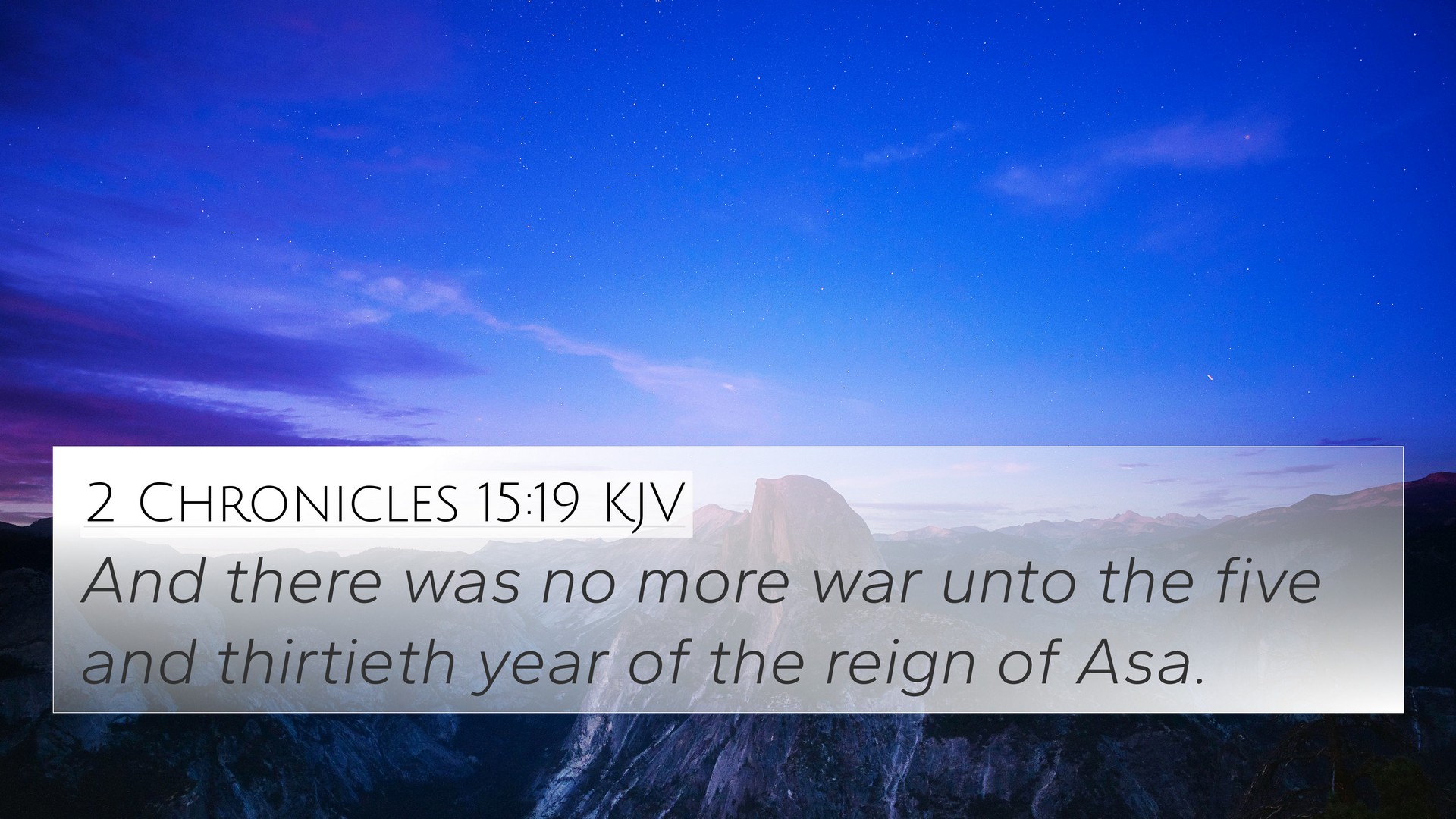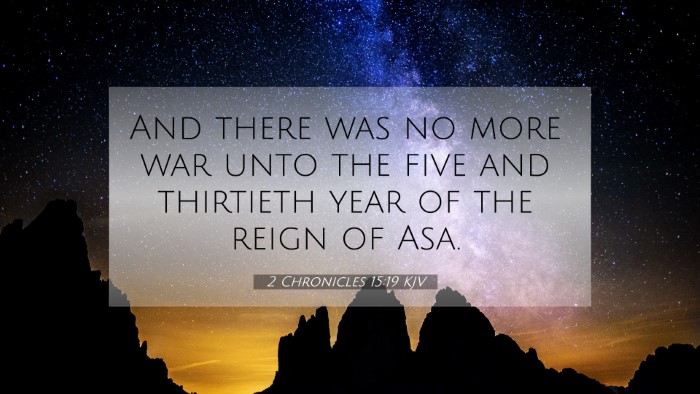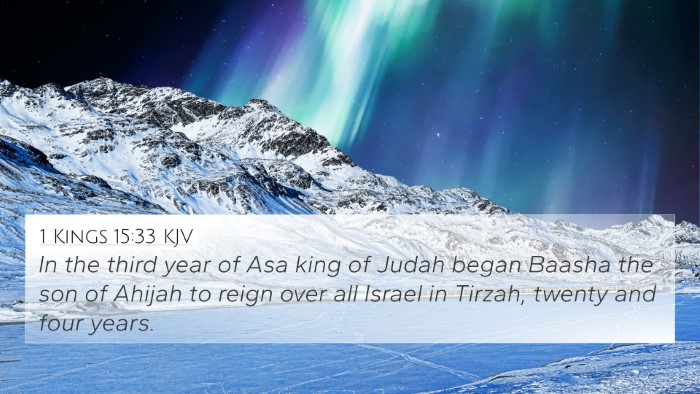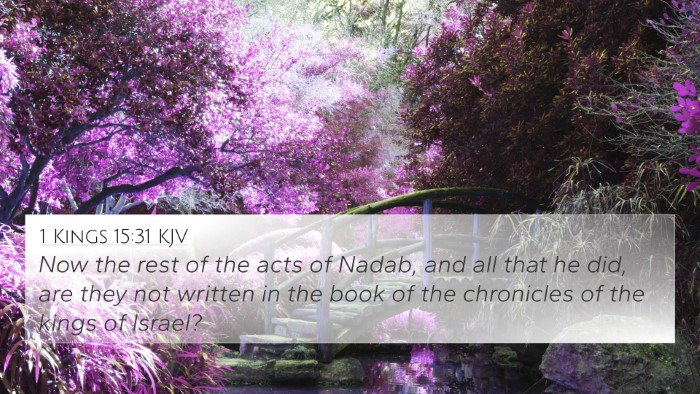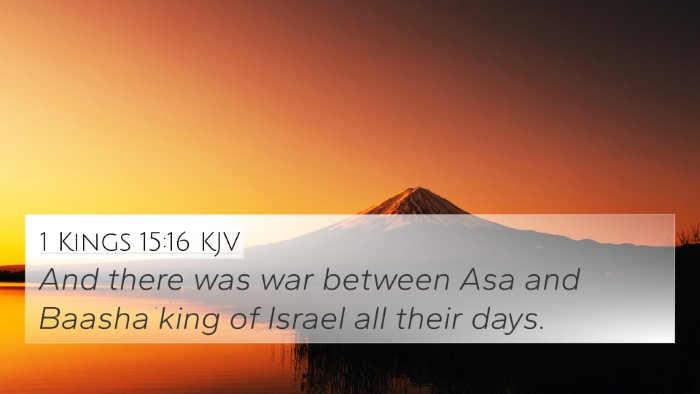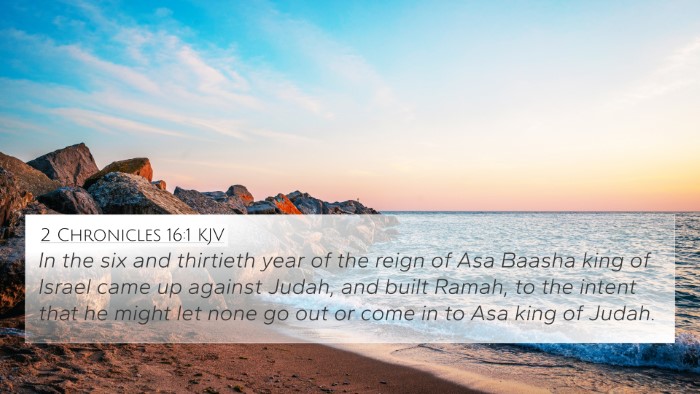Understanding 2 Chronicles 15:19
Key Verse: 2 Chronicles 15:19 states, "And there was no more war unto the five and thirtieth year of the reign of Asa." This verse concludes a significant period of peace during King Asa's reign in Judah.
Meaning and Significance of the Verse
This verse serves as a summary statement regarding the reign of King Asa. It emphasizes the tranquility that resulted from Asa's reforms and dedication to God. Following Asa's intentions to return Judah to proper worship and obedience to the Lord, the nation is rewarded with a lengthy period devoid of conflict. This can be seen as a divine approval of Asa's actions.
Insights from Public Domain Commentaries
Matthew Henry's Commentary
Henry notes that the peace mentioned in this verse is a testimony to Asa's faithfulness in reforming and turning the people back to God. The absence of wars reflects not only a political stability but also spiritual health within the nation. Asa's reliance on God through prayer and reforms led to a protected and prosperous Israel.
Albert Barnes' Notes on the Bible
Barnes remarks that this period of peace is indicative of God’s blessings upon Asa for his dedication to righteousness. He emphasizes that such peace is only achievable when a king, or a leader, seeks the guidance of God and leads the people in faithfulness to God’s commands. Asa's actions stand in stark contrast to those of previous kings who led Israel into sin and destruction.
Adam Clarke's Commentary
Clarke focuses on the implications of this peace, suggesting that it allowed Asa to focus on internal governance and improvements. The cessation of wars provided an opportunity for strengthening the nation's infrastructure and economy, enabling Asa to fortify cities and enhance military defenses, creating a strong foundation for future challenges.
Cross-References for Further Study
This verse can be enriched by exploring related biblical passages. Here are some relevant cross-references:
- 2 Chronicles 14:6-7: Discusses Asa's initial reforms and the peace he sought to establish.
- 2 Chronicles 15:15: Mentions the joyous response of the people to Asa’s reforms which contributed to the nation's peace.
- 1 Kings 15:11-12: Provides insights into Asa's overall reign and his adherence to God versus the practices of his predecessors.
- 2 Chronicles 16:9: Highlights God’s assurance to Asa that seeking Him leads to strength and guidance.
- Isaiah 26:3: This verse emphasizes the peace of mind and heart that comes from reliance on God, correlating with Asa's experience.
- Psalms 29:11: Speaks to the Lord’s ability to give strength and peace to His people.
- Philippians 4:7: Connects the peace of God that guards hearts and minds with the outcomes of trust in Him, similar to Asa’s kingdom.
Thematic Connections
The thematic analysis reveals deep connections between this verse and broader biblical themes of peace, righteousness, and divine favor. Asa's reign illustrates how fidelity to God elicits His blessings, a theme echoed throughout scripture. These connections facilitate an understanding of how biblical principles operate over time and across different contexts.
Conclusion
In summary, 2 Chronicles 15:19 serves as a powerful testament to the rewards of seeking God and leading His people in obedience. The reflections from commentaries provide rich insights that can enhance our understanding of peace in a biblical context. Through cross-referencing and thematic analysis, we can appreciate the interconnected nature of scripture and the consistent message of reliance on God for both leaders and nations.
Additional Resources for Cross-Referencing
- Bible Concordance
- Bible Cross-reference Guide
- Cross-reference Bible Study Methods
- Bible Chain References
- Comprehensive Bible Cross-reference Materials
Utilizing these resources can help in drawing thematic Bible verse connections and aid in our understanding of complex doctrinal issues.
